
NEWSLETTER
The gold standard in
global certication for all
laboratory professionals.
DECEMBER 2021
2 Chair’s Message
3 CMP COVID-RELATED Continuing Education
3 New CMP Requirements for Pathologists’ Assistant (PA)
Effective January 1, 2022
4 International Volunteer Opportunities
5 Update from the Board of Governors Meeting
5 Certication in Donor Phlebotomy Transitioning to a
Qualication January 2022
5 Revised MLT and MLS Examination Content Guidelines
6 Molecular Biology Certication: Recombinant DNA
Technology to Molecular Diagnostics - Today’s
Technology Inspired by Past Discoveries
7 Sharing of PPR Information
7 2022 PPR Invoice
7 PDAC to Host Live Events for BOC Program Directors
7 PBT and MLA Application Requirements
8 Transition of ASCP/ASCP
i
credentials: Medical
Technologist (MT) to Medical Laboratory Scientist (MLS)
8 In Memoriam: Susan King Strasinger, DA, MT(ASCP)
8 Sue Johnson, MSTM, MT(ASCP)SBB
CM
Receives
AABB’s John Elliott Memorial Award
9 2020 and 2021 ASCP BOC Distinguished Service
Awards Presentation
9 Online Documentation Forms
10 New Board of Governors Members
10 Board of Governers Volunteers 2021-2022
11 Exam Committee & Work Group Volunteers 2021-2022
13 Staff Spotlight: Lareka Pratt
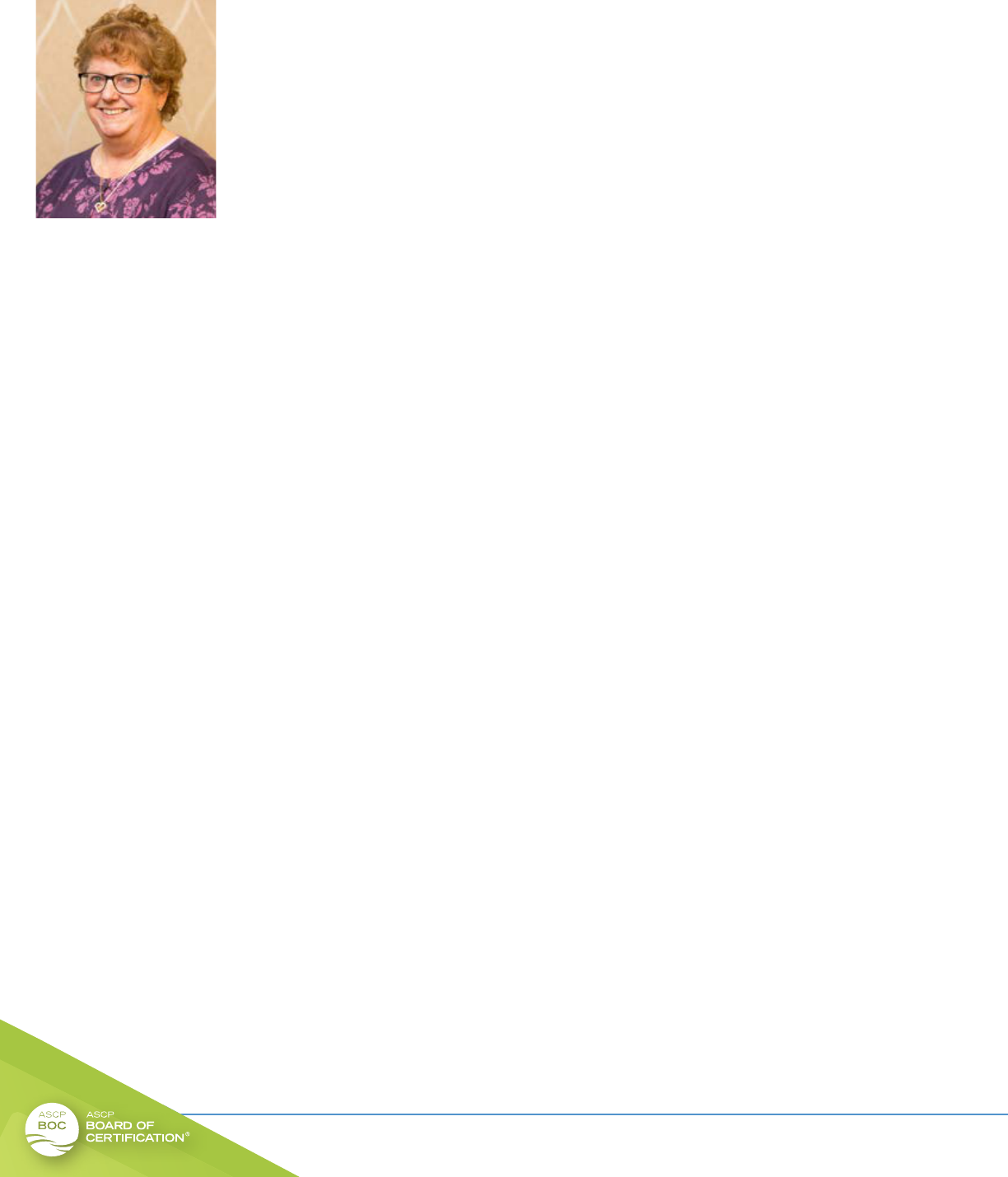
December 2021 BOC Newsletter | Page 2
CHAIR’S MESSAGE
At the end of October, the ASCP Board of Certication
(BOC) Board of Governors (BOG) met in person for the
rst time in two years, under the leadership of Susan
Johnson, MSTM, MT(ASCP)SBB
CM
. While this meet-
ing marked the end of Sue’s term as Chair, I would like
to acknowledge the magnitude of the challenges she
faced. Conducting the business of this organization
virtually required talent, tenacity, professionalism and
a sense of humor, all characteristics that Sue personi-
es. Her leadership has been steadfast and inspiring as
we have navigated the course during this pandemic. As
she leaves her role as Chair, we are all thankful for her
energy and poise. Assuming the role of Chair at the end
of the meeting is a bit daunting, but I feel prepared and
ready thanks to her mentoring and guidance.
I feel compelled to comment further on our abili-
ty to gather at the ASCP Annual Meeting in Boston. I
couldn’t help but appreciate the moments recaptured
when meeting face-to-face, the gathering time over a
cup of coffee where you could share comments with
friends without going to a “breakout room,” the sound
of the gavel calling the meeting to order, watching peo-
ple sit back in their chairs after a rousing discussion,
and feeling satised that their views were represented.
And, while we were masked out of respect for one an-
other, I found that we have learned how to smile with
our eyes.
The business of the meeting was both considerable
and signicant. While the details can be found in the
following pages, I’d like to highlight some items. The
work continues on the standardization of nomenclature
for Medical Laboratory Scientists. The collaborative ef-
forts of the ASCP BOC and the American Society of
Clinical Laboratory Science (ASCLS) have given rise to
a plan, approved by the ASCP BOC BOG, that includes
the transition of MT(ASCP) and MT(ASCP
i
) credentials
to MLS(ASCP) and MLS(ASCP
i
), respectively. It cannot
be overstated how unied efforts such as these bring
solidarity and recognition to our profession. Consistent
with this transition is the approval of new names for
certications in the area of Cytology. Cytologist will
replace Cytotechnologist and Specialist in Cytology
will replace Specialist in Cytotechnology beginning in
January 2022.
Annually, the Board of Governors recognizes individu-
als who have served the Board of Certication with dis-
tinction. BOC Distinguished Service Awards were pre-
sented to Patty Eschliman, MHA, MLS(ASCP)
CM
DLM
CM
,
and Lee Hilborne, MD, MPH, FASCP, DLM(ASCP)
CM
,
for 2020. For 2021, BOC Distinguished Service Awards
were presented to Amy Groszbach, MEd, MLT(ASCP)
MB
CM
, Susan Harrington, PhD, D(ABMM),
MLS(ASCP)
CM
, Lena Spencer, HTL(ASCP)QIHC
CM
, and
Terry Taff, MA, MT(ASCP)SM. It is a joy to honor and
celebrate their contributions and accomplishments.
Two members of the ASCP BOC Board of Governors
completed their tenure on the Board. Always a bit-
tersweet moment of celebration and sadness, we are
grateful to Laura Bilodeau, MD, FASCP, and Kathleen
Finnegan, MS, MT(ASCP)SH
CM
, for their substantial and
remarkable service to the ASCP Board of Certication
and the Board of Governors. As they leave the Board,
we welcome new members Rex Famitangco, MSc,
MLS(ASCP)
CM
QLC
CM
, and Andreana Rivera, MD,
FASCP. We look forward to the contributions of our new
colleagues.
As the new year unfolds, the exam committees will
meet to continue the important work of reviewing and
revising the components of the certication and quali-
cation exams. As the landscape of the clinical labora-
tory changes, so must the certication process to en-
sure the competency of the individuals implementing
those changes. In closing, I hope 2022 provides a safe,
healthy, and successful new year.
Susan Graham,
MS, MT(ASCP)SH
CM

December 2021 BOC Newsletter | Page 3
CMP COVID-RELATED CONTINUING EDUCATION
The ASCP Board of Certication (BOC) recognizes the vital work of laboratory professionals in response to the
COVID-19 pandemic and the critical professional development it necessitated. We heard your concerns about
obtaining continuing education during the pandemic due to increased workloads and limited availability of in-per-
son training or conferences. This prompted the BOC to develop a time-limited opportunity to use COVID-related
activities completed between March 1, 2020 and December 31, 2021 for up to 12 CMP points towards recertica-
tion. These points should be self-entered as a single CMP activity and allocated under “related areas of interest”
on the online declaration form.
Criteria to Claim Credits for the CMP
• To be accepted, COVID-related continuing education (CE) activities must have been completed between
March 1, 2020 and December 31, 2021(and be within your three-year CMP cycle).
• Activities must be work-related and new, additional, or out-of-specialty skills or activities.
• Your Manager/Supervisor must review, verify, and sign-off on the completed activities indicated on the CMP
COVID-related CE Claim Form.
• The maximum number of CMP points accepted on the Claim Form is 12.
• These CMP points may be used forrelated areas of interestonly.
• The CMP COVID-related CE Claim Form may be used one-time only and for a single CMP cycle.
For more information about this opportunity please refer to this link: http://www.ascp.org/cmp/covid-points
NEW CMP REQUIREMENTS FOR PATHOLOGISTS’
ASSISTANT (PA) EFFECTIVE JANUARY 1, 2022
New Pathologists’ Assistant (PA) CMP requirements go into effect January 1, 2022.
The new requirements will be revised by adding 15 new points specically related to cancer cases and their stag-
ing and 1 point in medical ethics for a total of 60 points. The new requirements apply to all PA(ASCP) certicants.
The new CMP point distribution will be as follows:
• 1 point in laboratory or patient safety (i.e. quality control, quality assurance)
• 20 points in anatomic pathology
• 15 points in advanced anatomic pathology (cancer specimen examination/staging)NEW
• 1 point in medical ethicsNEW
• 23 points in area(s) of anatomic pathology, management, education or other clinical specialties
The ASCP Board of Certication (BOC) accepts continuing education (CE) for recertication from all sources, as
long as they meet the requirements of the program. As a CE provider, ASCP continues to work on developing
educational content to support the CMP.
The American Association of Pathologists’ Assistants (AAPA), is well equipped to offer these additional required
credits.Please visit their website for further information: www.pathassist.org
In addition, outside sources that meet the denition of “advanced cancer anatomic pathology” (hospital tumor
boards or similar medical conferences) would also qualify for self-recordedCE credits for the additional PA CMP
requirements.
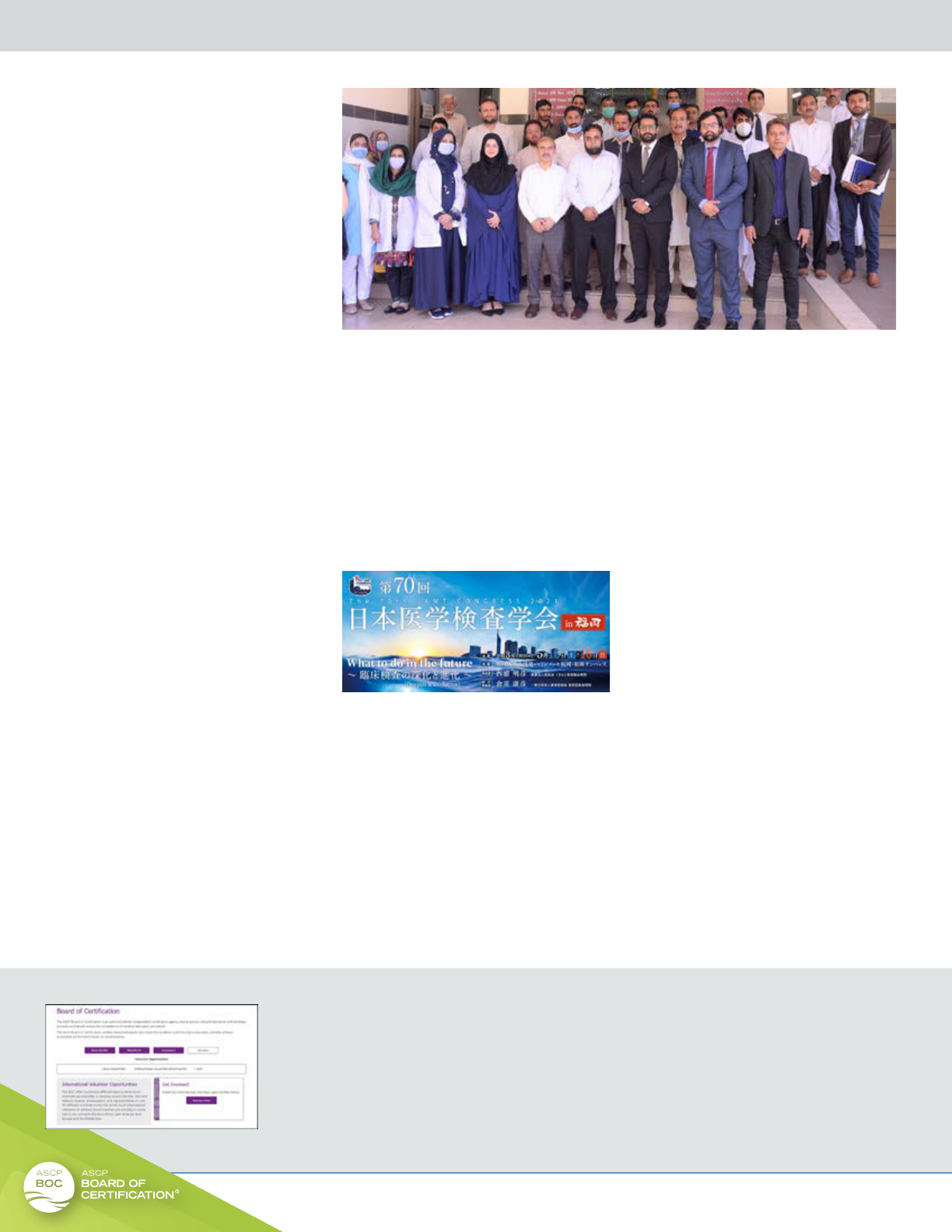
ASCP BOARD OF CERTIFICATION INTERNATIONAL NEWS ROUNDUP
December 2021 BOC Newsletter | Page 4
BOC International Advisory Boards
As part of our efforts to contribute globally to
the highest standards of patient safety, the
ASCP Board of Certication (BOC) works to
establish advisory boards in all countries re-
questing additional support and representa-
tion. International Advisory Board members
are typically program directors of clinical
laboratory educational programs, laboratory
supervisors, and/or representatives from a
country or region’s clinical laboratory society.
2021 BOC International Advisory Board
Appointments
• India: Ajay Kumar Prajapati, PhD, and
Deepika Varsha, GS, CG(ASCPi)
CM
, joined
the India Advisory Board in June 2021.
• Korea: Kyung Jin Cho, PhD, stepped down
as Chair of the S. Korea Advisory Board in
April 2021 although he will remain a mem-
ber of the Board. Dr. Cho’s successor (new
chair) is Hyo Chan Kang, PhD.
• Pakistan: Muhammad Saeed, MPhil, and
Noore Saba, MBBS, MSPH, MPhil, joined
the Pakistan Advisory Board in May 2021.
• Saudi Arabia: Waleed Tamimi, BSc,
PhD, SC(ASCP), joined the Saudi Arabia
Advisory Board in May 2021.
BOC Participates in the 70th Annual
Congress
The Japanese Association of Medical
Technologists (JAMT) a collaborating society
of the BOC, held their annual congress (vir-
tually) from May 15-June 14, 2021. As part
of the conference, JAMT provided the BOC
with a virtual booth, and made the Japanese
version of the BOC’s international certica-
tion brochure available for download via the
congress website. The total number of par-
ticipants for the congress was 7,168.
In addition to its collaborating society
agreement with JAMT, the BOC also has a
partnership with JAMT, and Loyola University
Medical Center (LUMC-Maywood, IL), to ar-
range for Japanese laboratory profession-
als to visit a laboratory in the U.S. for one
week. The 2019 JAMT visitor, Mari Kunihiro,
H(ASCP
i
), recently earned her International
Technologist in Hematology H(ASCP
i
) creden-
tial. Since 2015, when this partnership was
established, four out of six Japanese visitors
have earned a BOC credential.
BOC International Certication
Seminar in Islamabad
An ASCP
i
seminar was held in Islamabad,
Pakistan, on August 17, 2021. The semi-
nar was organized by the Pakistan Advisory
Board and included an overview of how to
navigate the ASCP BOC examination appli-
cation process. Approximately 50 people at-
tended the seminar.
During the seminar, Usman Waheed, PhD,
and Chair of the Pakistan Advisory Board,
said that the medical laboratory profession is
becoming one of the most appealing profes-
sions in Pakistan. He then emphasized that
BOC certication is a major asset for any
Pakistani laboratory professional who wants
to demonstrate that they have the knowl-
edge and skills to perform essential tasks in
the laboratory. Technical experts who also
delivered talks on the scope of the medical
laboratory profession during the seminar in-
cluded: Dr. Noor e Saba, MPhil; Dr Akhlaaq
Wazeer, MPhil; Dr. Muhammad Rehan, and
Muhammad Saeed, MPhil.
BOC Participates at the II Latin
American Conference for Biomedicine
and Laboratory Science
The Southern Brazilian Association for
Biomedicine invited the BOC to participate at
their virtual conference held on June 8-10, 2021.
The session titled “Opportunities for Brazilian
Biomedics in the USA” shared information on
ASCP BOC international certication and its ben-
ets, both in the U.S. and abroad. Participants
showed particular interest in the application re-
quirements and process, as well as recommen-
dations for preparing for the exams.
INTERNATIONAL VOLUNTEER OPPORTUNITIES
The BOC offers numerous different ways to serve as an international volunteer or advisory board member.
We have advisory boards, ambassadors, and representatives in more than 30 different countries worldwide.
As an international volunteer or advisory board member, you can play a crucial role in our outreach efforts
in Africa, Latin America, Asia, Europe, and the Middle East. Check out international volunteer opportunities
with the BOC at https://www.ascp.org/content/board-of-certication/about-boc#advisory_boards.
Participants of the ASCP
i
seminar in Islamabad, Pakistan.

December 2021 BOC Newsletter | Page 5
UPDATE FROM THE BOARD OF GOVERNORS MEETING
The ASCP Board of Certication (BOC) Board of Governors met October 30–31, 2021. Several motions were
passed that impact eligibility requirements, as summarized below. All updated eligibility requirements will be
available on the ASCP BOC website by early 2022. www.ascp.org/certication
Technologist in Cytogenetics
• Route 3 of the U.S. and International CG(ASCP)/CG(ASCP
i
) was updated to require six months, rather than nine
months, of experience. This was to make all routes equivalent for this category of examination.
Cytologist and Specialist in Cytology
• “Cytologist” has been adopted as new terminology. The existing credential title of Cytotechnologist [CT(ASCP)/
CT(ASCP
i
)] is changed to Cytologist [CT(ASCP)/CT(ASCP
i
)] and Specialist in Cytotechnology [SCT(ASCP)/
SCT(ASCP
i
)] is changed to Specialist in Cytology [SCT(ASCP)/SCT(ASCP
i
)]. This will go into effect in January
2022. For further information, please click here for the ASCP ePolicy article.
• Specialist in Cytology - A new route was added to the SCT(ASCP) examination to allow someone who gradu-
ated from a master’s level CAAHEP accredited cytology program and completion of a Master’s degree to sit for
the exam. This route will be available for application in January 2022.
Histotechnician and Histotechnologist
• For both the U.S. HT(ASCP) and HTL(ASCP), a route was added allowing for members of the military who com-
pleted a military program, and who have the appropriate science coursework, to sit for the exam. These routes
will be available for application in January 2022.
• Histotechnician - Route 1 of the International HT(ASCP
i
) had added clarity regarding the education required to
be eligible under this route.
Medical Laboratory Technician and Medical Laboratory Scientist
• For both MLT(ASCP) and MLS(ASCP), the route requiring CLA(ASCP) certication will be discontinued as of
January 1, 2023. Information about this change will be posted to the website in January 2022.
Qualication in Biorepository Science
• (QBRS) had clarity added to the type and amount of science coursework required for eligibility.
CERTIFICATION IN DONOR PHLEBOTOMY
TRANSITIONING TO A QUALIFICATION JANUARY 2022
The current certication for Donor Phlebotomy Technician, DPT(ASCP) will be transitioning to the Qualication in
Donor Phlebotomy, QDP, as of January 1, 2022. Complete information is available here: www.ascp.org/boc/dpt
and www.ascp.org/boc/qdp.
REVISED MLT AND MLS EXAMINATION CONTENT
GUIDELINES
Examination Content Guidelines for the MLT and MLS exams administered beginning January 1, 2022,
have been revised. The revised content guidelines are currently available on the Get Credentialed page
of the BOC website.

December 2021 BOC Newsletter | Page 6
MOLECULAR BIOLOGY CERTIFICATION: RECOMBINANT DNA
TECHNOLOGY TO MOLECULAR DIAGNOSTICS - TODAY’S
TECHNOLOGY INSPIRED BY PAST DISCOVERIES
by Lela Buckingham, PhD, MSc, MB(ASCP)
CM
DLM
CM
Nucleic acid testing techniques used in the
clinical laboratory are based on momentous
discoveries leading to what was called re-
combinant DNA technology. Even with their
futuristic visions, early scientists may not
have predicted what we take for granted as
routine work today. Imagine the reactions
of historical scientists to our current pro-
cedures. The Greek physician Hippocrates
(400-377 BC) is credited with the initiation
of diagnostic testing of patient body uids.
He may not have realized the true wealth of
information in these materials, stored inside
of nucleated cells in the form of deoxyribo-
nucleic acid (DNA), carried by ribonucleic
acid (RNA) to be translated into protein and
ultimately the phenotypes he observed. We
can only wonder how prescient his vision of
the information held in body tissues and u-
ids actually was.
The form of genetic information was rst
proposed in 1866 by Gregor Mendel as dis-
creet units of inheritance. Mendel would
likely be gratied that his theories have
been the basis of molecular genetic testing.
Fredrich Meischer, who rst isolated nucleic
acid from cells in 1869, would be intrigued
by automatic nucleic acid isolation systems
currently used and our ability to obtain his
“nuclein” from unlikely sources such as pre-
served tissue and touched objects. Walther
Flemming would certainly appreciate the in-
tricate uorescent imaging technology that
allows medical laboratory scientists to ob-
serve and study the mitotic chromosomes
that he rst described in 1882.
Scientic interest in nucleic acid analy-
sis grew through the late 1940s to early
1950s. After their experiments in the 1940s
on DNA as the genetic material, Oswald
Avery, Frederick Grifth, Maclyn McCarty,
and Colin McCleod might still be fascinat-
ed with its use for detection and identica-
tion of microorganisms and how disease
risk could be traced through DNA. Study of
DNA was highlighted by the rst descrip-
tion of its molecular structure published by
James Watson and Francis Crick in 1951.
Rosalind Franklin’s famous X-ray diffrac-
tion images were key to the solution of the
double helix. What would she think of the
use of computerized sequence analysis to
instantly predict effects of amino acid sub-
stitutions on protein structure and function?
Who among the many contributors to the
discovery of messenger RNA 10 years lat-
er would have predicted the use of a modi-
ed RNA as a therapeutic vaccine? Werner
Arber, Daniel Nathans and Hamilton Smith,
who rst described restriction enzymes in
the mid 1960s, may eventually have con-
sidered the potential use of the Cas en-
zyme and clustered regularly interspaced
short palindromic repeats (CRISPR) for
gene therapy. After the demonstration of
semiconservative DNA replication in 1958,
Matthew Meselson and Frank Stahl would
certainly be intrigued by the discovery by
Kerry Mullis leading to the nucleic acid am-
plication methods routinely performed by
laboratory scientists today. As high com-
plexity tests using nucleic acids evolved,
single target hybridization techniques gave
way to multiplex arrays and cytogenetic im-
aging as well as nucleic acid amplication
and sequencing methods.
The American Society of Clinical Pathology
(ASCP) recognized the importance of cer-
tied knowledge and skills in molecu-
lar biology and, in 2003, implemented the
Technologist in Molecular Pathology (MP)
Certication Examination, which is now
the Technologist in Molecular Biology
(MB) Examination. Certication in molecu-
lar biology initially offered by the National
Credentialing Agency for Laboratory
Personnel (NCA) in 1997 was recognized
by ASCP in 2009. Medical scientists with
ASCP certication have realized preferred
hiring by medical and industrial laborato-
ries developing and utilizing DNA and RNA
analysis for nucleic acid testing, as well as
development of diagnostic products and
instrumentation.
Molecular diagnostics as a key aspect of
patient care has also led to opportunities for
administrative and management positions
in this area. In medicine, molecular pathol-
ogy has become a valuable component of
diagnostic and prognostic interpretation for
physicians. This requires laboratorians who
have developed specialized skills, not only
in performance of molecular protocols, but
design and interpretation of nucleic acid
testing methods for diagnosis and charac-
terization of acquired and inherited diseas-
es. Bioinformatics for clear communications
with physicians and other health profession-
als is of tantamount importance. In keeping
current with the evolution of the profession,
ASCP introduced the Specialist in Molecular
Biology (SMB) Certication Examination in
2018. This examination addresses skills re-
quired for supervisors, managers and direc-
tors of molecular diagnostics laboratories
including advanced molecular testing, bio-
informatics, novel clinical applications and
laboratory management, including method
design and test development.
To establish eligibility for the MB examina-
tion, there are sets of minimum prerequisites
(routes), depending on education, training
and experience. These include combina-
tions of a baccalaureate or higher degree
from a regionally-accredited college/univer-
sity. In addition to formal training, full time
experience in a molecular biology laborato-
ry that offers molecular methods including
nucleic acid isolation, amplication, detec-
tion, sequencing, hybridization techniques,
and data analysis is required. The time of
experience (six months to one year) de-
pends on the level of education completed.
Routes of eligibility for the SMB examina-
tion include successful completion of the
MB examination and a baccalaureate or
higher degree and full-time experience in
molecular biology laboratory (one to three
years). Detailed descriptions of the routes to
eligibility for testing and subject content for
the MB and SMB can be found at ascp.org.
As in other elds of study, technology is
rapidly advancing. Keeping current with on-
going developments through classes, as-
sociation and society meetings, original
articles, texts, new product development
and electronic sources can not only ben-
et those wishing to become certied in
this area, but enhance existing laboratory
skills. Scientists of the past would marvel at
what is possible in the molecular diagnos-
tics laboratories today. And we have not yet
imagined the wonders of the future for this
technology, using nucleic acids for predic-
tion, diagnosis, treatment, and eradication
of disease.

December 2021 BOC Newsletter | Page 7
SHARING OF PPR INFORMATION
The ASCP Board of Certication (BOC) would like to remind program directors that the Program Performance
Report (PPR) is a paid subscription service meant for use by program directors and program administrators only;
specic data from the PPR is not to be shared with the public. The information contained in the PPR should be
handled in a condential manner which respects the rights of the individual whose scores are reported. Individual
student data, subtest means, scaled score comparisons, and the histogram are not public information. This infor-
mation should not be shared publicly, including for recruitment efforts or marketing purposes.
Any data that is shared with accrediting bodies or program administration must be anonymized and aggregated
where possible. As an outcomes measure for accreditation purposes, program directors may publicly share over-
all program pass rates (i.e., our graduates have a X- year average pass rate of XX percent on national certication
exams; the national average is XX percent).
2022 PPR INVOICE
Payment Due Jan. 1, 2022 for Uninterrupted Access
Emails with a link to access the 2022 Program Performance Report (PPR) invoices were sent to all program direc-
tors of NAACLS, CAAHEP, and ABHES accredited/approved programs, as well as BOC-documented structured
phlebotomy and MLA training programs, on October 12, 2021. A reminder email was sent in early December.
The invoice amount is $150 per program and covers the period of January 1, 2022, through December 31, 2022.
Payment instructions are included on the invoice.
PDAC TO HOST LIVE EVENTS FOR BOC PROGRAM
DIRECTORS
The ASCP BOC Program Director’s Advisory Committee (PDAC) is made up of volunteers with several years of
program experience. One of their main roles is to manage the Program Director’s Facebook group. They have
also started hosting live events over Zoom to discuss topics that are top of mind to program directors. The rst
event, held on December 3, 2020, was a “meet and greet” focused on networking and sharing ideas for future live
events. The second, held on April 20, 2021, provided program directors with a tour of the BOC website, as well
as a deep dive into the EEV process. You can nd the recording here. Check the Facebook page for details about
upcoming events.
PBT AND MLA APPLICATION REQUIREMENTS
Phlebotomy (PBT) and Medical Laboratory Assistant (MLA) applicants must be able to verify that they meet all
eligibility requirements, including proof of high school graduation or equivalent. All applicants are required to sub-
mit ofcial transcripts to verify high school graduation or equivalency in order to meet the eligibility requirements.
Acceptance into a program or institution does not verify the meeting of this academic requirement.
Complete information is available on the ASCP BOC website at www.ascp.org/boc/transcript. If you have ques-
tions about verifying high school graduation or equivalency, please email us at [email protected].

December 2021 BOC Newsletter | Page 8
TRANSITION OF ASCP/ASCP
i
CREDENTIALS
Medical Technologist (MT) to Medical Laboratory Scientist (MLS)
In 2020, the ASCP Board of Certication (BOC) and the American Society of Clinical Laboratory Science (ASCLS)
collaborated and wrote a position paper titled, “Standardizing the Professional Title of Medical Laboratory
Scientists.” The paper was endorsed by all of the ASCP BOC Sponsoring, Participating, and Collaborating soci-
eties. The primary purpose of the paper was to address the inconsistency of professional nomenclature and the
impact this has had on the profession and the professionals’ identity. Visit the ASCP BOC website to read the
complete paper.
At the BOC Board of Governors (BOG) meeting in October 2021, the BOG approved a plan to transition all
MT(ASCP) and MT(ASCP
i
) credentials to MLS(ASCP) and MLS(ASCP
i
). This change of terminology from Medical
Technologist to Medical Laboratory Scientist is a critical step in the move towards standardizing the professional
title of medical laboratory professionals. BOC staff will be implementing this transition in 2022.
IN MEMORIAM
Susan King Strasinger, DA, MT(ASCP)
July 2, 1939–August 11, 2021
We mourn the loss of Susan King Strasinger, DA, MT(ASCP).
Susan was the consummate medical laboratory science pro-
fessional and during her career was an educator, a mentor, an author, and a volunteer for ASCP. For many years,
Susan was the MLT program director for Northern Virginia Community College and later an adjunct professor in
the Clinical Laboratory Sciences Program at the University of West Florida in Pensacola. She served as the chair
and vice-chair of the ASCP Board of Certication’s (BOC) Joint Generalist Certication Examination Committee.
For a decade, she served on the ASCP LabQ Editorial Board (Editor-in-Chief, co-chair, and associate editor) and
served on the Commission on Publications. Susan and Marjorie DiLorenzo are the authors of the quintessential
book, “Urinalysis and Body Fluids,” which has been on BOC’s suggested reading list for MLT and MLS for de-
cades. Her contributions to medical laboratory science will live on through everyone who has been touched by her.
To read more about Susan’s life, or to leave a message to her family, go to www.wolfefuneralhomes.com/
obituary/susan-strasinger
SUE JOHNSON, MSTM, MT(ASCP)SBB
CM
RECEIVES
AABB’S JOHN ELLIOTT MEMORIAL AWARD
ASCP Board of Certication Board of Governors Past Chair, Sue Johnson, MSTM, MT(ASCP)SBB
CM
, was awarded
the 2021 John Elliott Memorial Award by the Association for the Advancement of Blood and Biotherapies (AABB).
She is the Director of Clinical Education at Versiti and Director of the Transfusion Medicine Program at Marquette
University.
Established in 1956, the John Elliott Memorial Award recognizes individuals who have given outstanding service
to AABB by demonstrating a willingness to lend his/her expertise to the association through work on committees,
the AABB Board of Directors and other areas.
Ms. Johnson was selected for her extraordinary commitment and involvement on various committees and service
through her numerous presentations of AABB programs related to immunohematology and reference laboratories.
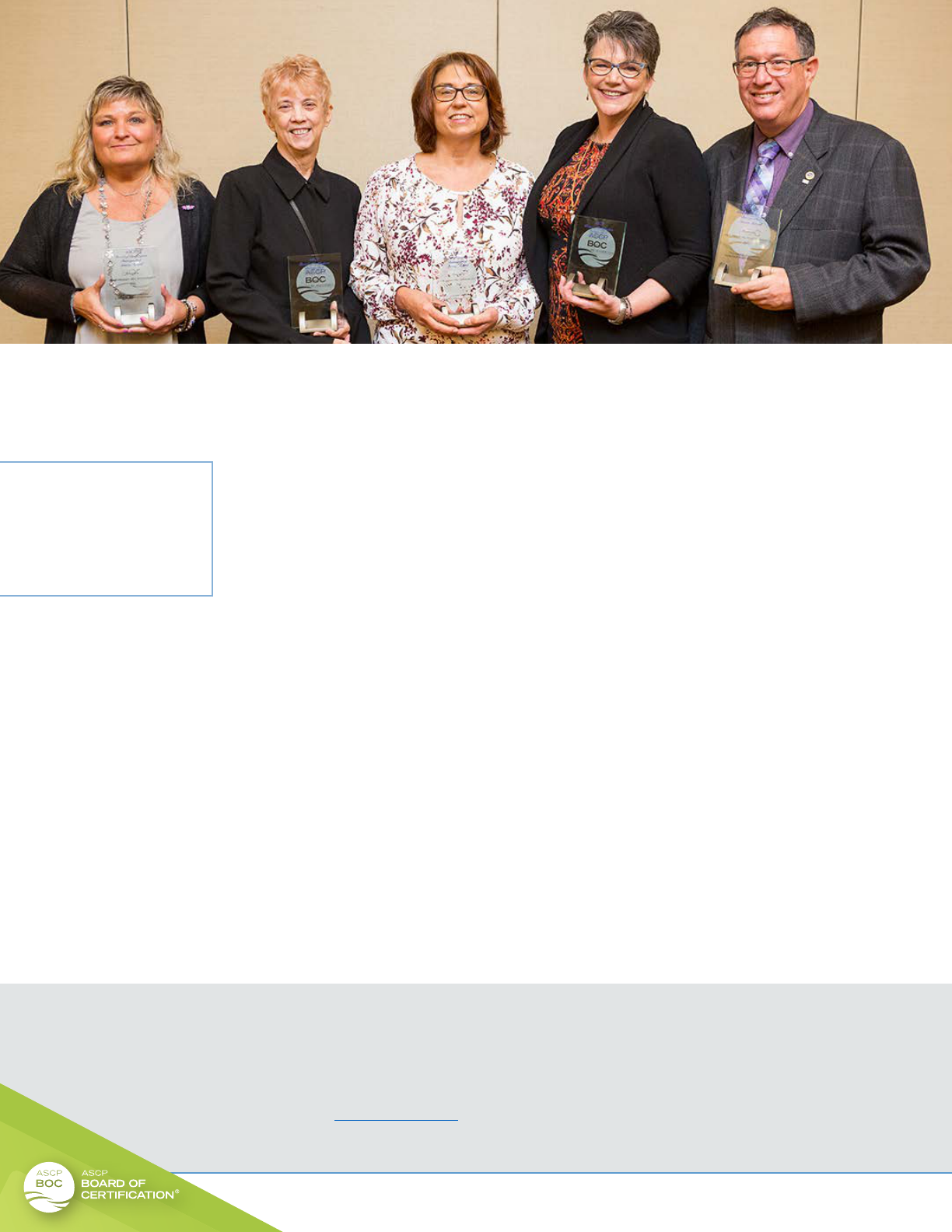
December 2021 BOC Newsletter | Page 9
2020 AND 2021 ASCP BOC DISTINGUISHED SERVICE
AWARDS PRESENTATION
The ASCP Board of Certication (BOC) recognized several volunteers at an awards ceremony in Boston on
October 30, 2021. The BOC Board of Governors Chair, Sue Johnson (October 2019–September 2021) presented
the BOC Distinguished Service Award (DSA) to both the 2020 and 2021 recipients at a luncheon in their honor.
The DSA is presented to volunteers who have served the BOC for a minimum of six years and made signicant
contributions involving extra time and effort toward the BOC mission to provide excellence in certication of labo-
ratory professionals on behalf of patients worldwide.
The recipients honored in Boston include:
• Patty Eschliman, MHA, MLS(ASCP)
CM
DLM
CM
, was awarded a 2020 DSA. Ms. Eschliman served as the Clinical
Laboratory Management Association (CLMA) representative to the BOG from 2010–2019. She currently serves
on the Laboratory Management Examination Committee.
• Amy Groszbach, MEd, MLT(ASCP)MB
CM
, was awarded a 2021 DSA. Ms. Groszbach served as one of the
Association of Genetic Technologists (AGT) representatives to the BOG from 2011–2020.
• Susan Harrington, PhD, D(ABMM), MLS(ASCP)
CM
, was awarded a 2021 DSA. Dr. Harrington served as the
American Society for Microbiology (ASM) representative to the BOG from 2010–2020. She served as the Chair
of the BOG from 2017–2019.
• Lee Hilborne, MD, MPH, FASCP, DLM(ASCP)
CM
, was awarded a 2020 DSA. Dr. Hilborne served as one of
the American Society for Clinical Pathology Fellow representatives to the BOG from 2010–20219. He currently
serves on the Laboratory Management Examination Committee.
• Lena Spencer, HTL(ASCP)QIHC
CM
, was posthumously awarded a 2021 DSA. Ms. Spencer served as the
National Society for Histotechnology (NSH) representative to the BOG from 2011–2020. Ms. Spencer lost her
battle with cancer in December 2020. The DSA was sent to her family.
• Terry Taff, MA, MT(ASCP)SM
CM
, was awarded a 2021 DSA. Ms. Taff served on the Microbiology Examination
Committee from 2013–2020 and currently serves on the BOC Research and Development Committee.
ONLINE DOCUMENTATION FORMS
Documentation forms submitted through the mail will not be accepted or processed. All documentation
forms and letters of authenticity must be sent to the appropriate documentation mailbox for the category of ap-
plication. See the COVID-19 document for complete information.
Pictured (left to right)
Amy Groszbach,
Terry Taff,
Susan Harington,
Patty Eschliman,
and Lee Hilborne.
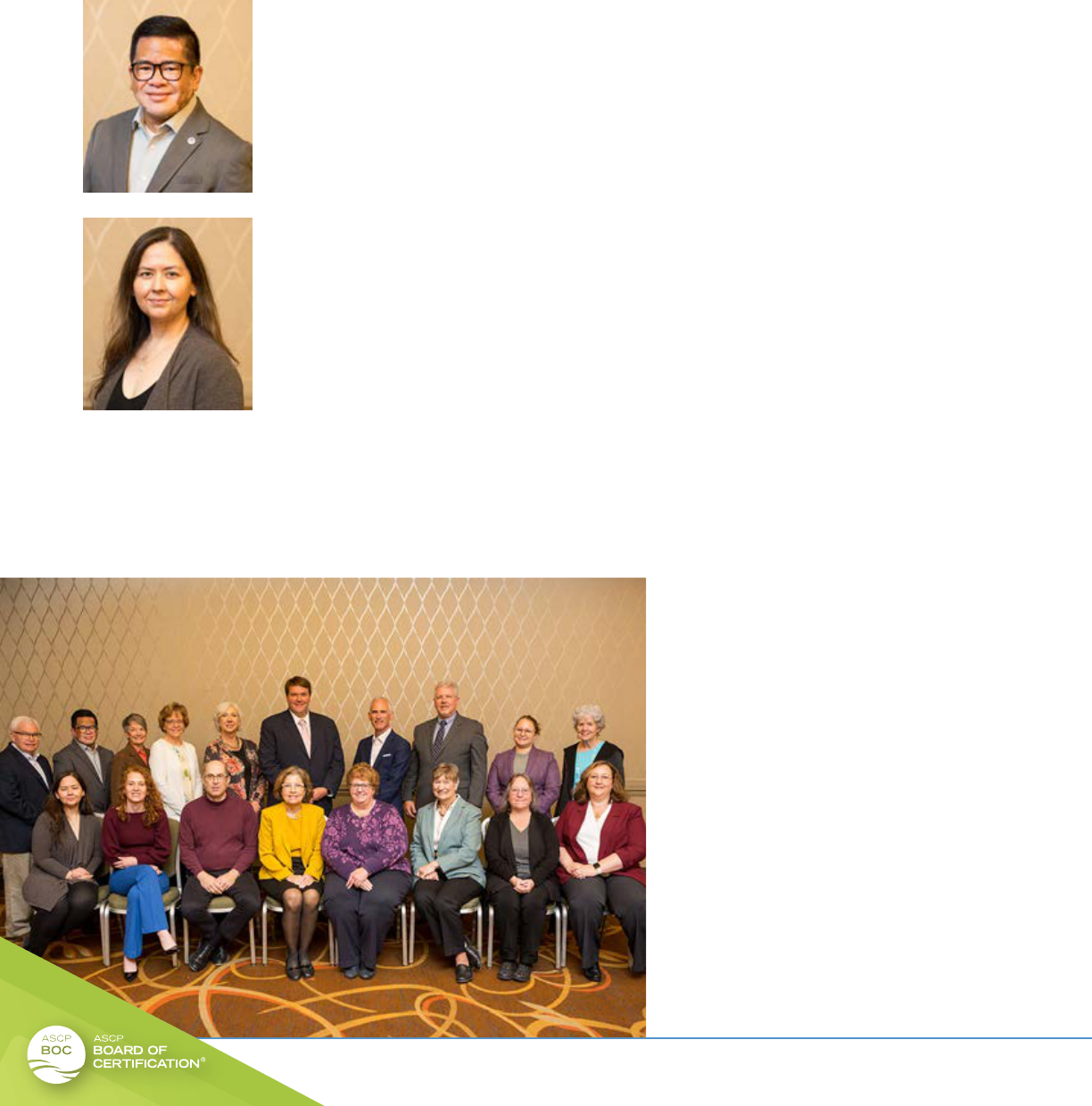
December 2021 BOC Newsletter | Page 10
Andreana (Andy) Rivera, MD, FASCP, joins the
Board of Governors as one of the American Society
for Clinical Pathology Fellow representatives. She
is a Neuropathologist and Anatomic Pathologist at
Houston Methodist Hospital in Texas. Dr. Rivera has
served on the BOC Histotechnology Examination
Committee since 2015.
Rex Famitangco, MSc, MLS(ASCP)
CM
QLC
CM
,
joins the Board of Governors as one of the
American Society for Clinical Pathology labo-
ratory professional representatives. He is the
Laboratory Administrative Director at Morrill
County Community Hospital in Bridgeport, NE.
NEW BOARD OF GOVERNORS
MEMBERS
At the October 2021 Board of Certication Board of Governors (BOG) meeting in
Boston, two new members were welcomed to the BOG.
BOARD OF GOVERNERS
VOLUNTEERS 2021-2022
Executive Committee
Chair
Susan Graham, MS, MT(ASCP)SH
CM
- NY
Past Chair
Susan Johnson, MSTM, MT(ASCP)SBB
CM
– WI
Secretary
Vicki Freeman, PhD, MASCP, MLS (ASCP)
CM
SC
CM
, FAACC – TX
Financial Ofcer
Thomas Alexander, PhD, D(ABMLI) - OH
ASCLS Representative
Joan Polancic, MSEd, MLS(ASCP)
CM
– CO
AGT Representative
Denise Anamani, MA, I(ASCP)MB
CM
– CT
Member-At-Large
William Finn, MD, MASCP - MI
Participating Society Representative
Michael Sovocool, MHS, PA(ASCP)
CM
– NY
Governors
Dana Altenburger, MD, FASCP – IL
J.R. Constance, MHA, MLS(ASCP)
CM
– CO
Dana Duzan, MLS(ASCP)
CM
– WA
Rex Famitangco, MSc, MLS(ASCP)
CM
QLC
CM
– NE
Elaine Francis, EdD – MA
Catherine Gebhart, PhD, D(ABHI), MB(ASCP)
CM
– MA
Amanda Harrington, PhD, D(ABMM) – IL
Alexandra Harrington, MD, FASCP, MT(ASCP) – WI
Ericka Hendrix, PhD, MB(ASCP)
CM
–TX
Barbara McGahey-Frain, MS, SCT(ASCP)
CM
– IN
Andreana Rivera, MD FASCP – TX
Lori Schmitt, HT(ASCP)QIHC
CM
– PA
Linda Smith, PhD, MLS(ASCP)
CM
BB
CM
– TX
Geoffrey Talmon, MD FASCP – NE
Patti Walton, MHSA, MT(ASCP) – TN
Front row (left to right): Andreana Rivera, MD FASCP;
Alexandra Harrington, MD, FASCP, MT(ASCP);
Thomas Alexander, PhD, D(ABMLI); Sue Johnson, MSTM,
MT(ASCP)SBB
CM
; Susan Graham, MS, MT(ASCP)SH
CM
;
Vicki Freeman, PhD, MASCP, MLS(ASCP)
CM
SC, FAACC;
Denise Anamani, MA, I(ASCP)MB
CM
; and Catherine Gebhart,
PhD, D(ABHI), MB(ASCP)
CM
.
Back row (left to right): Michael Sovocool, MHS, PA(ASCP)
CM
;
Rex Famitangco, MSc, MASCP, MLS(ASCP)
CM
QLC
CM
;
Dana Duzan, MLS(ASCP)
CM
; Joan Polancic, MSEd, MLS(ASCP)
CM
;
Barbara McGahey-Frain, MS, SCT(ASCP)
CM
; Geoffrey Allen
Talmon, MD FASCP; William Finn, MD, MASCP;
J.R. Constance, MLS(ASCP)
CM
; Dana Altenburger, MD,
FASCP; and Elaine Francis, EdD.
Not pictured: Amanda Harrington, PhD, D(ABMM); Ericka
Hendrix, PhD, MB(ASCP)
CM
; Lori Schmitt, HT(ASCP)QIHC
CM
;
and Linda Smith, PhD, MLS(ASCP)
CM
BB
CM
.

December 2021 BOC Newsletter | Page 11
EXAMINATION COMMITTEE & WORK GROUP
VOLUNTEERS 2021-2022
APHERESIS QUALIFICATION WORK GROUP
Chair
Christina Anderson, RN, BSN, HP(ASCP) – TX
Vice Chair
Antonia Hagen-Coonradt, RN, BSB – MT
Members
Betty Doggett, AT(ASCP)
CM
– TX
Christine Fernandez, RN, MSN – CO
Marisa Marques, MD, FASCP – AL
Cheryl Pacheco BSN, RN, CPN, QIA
CM
– MA
Joseph Schwartz, MD, MPH, QIA
CM
– NJ
BIOREPOSITORY QUALIFICATION WORK
GROUP
Chair
Kathy Mangold, PhD, MB(ASCP)
CM
– IL
Members
Anne Breggia, PhD, MT(ASCP), CHS(ASHI) – ME
Mary Ann Clements, BS – VA
Annemieke De Wilde, MS – Belgium
Carol Elliott, MS, CG(ASCP)
CM
, RAC, CCRP – AZ
Hector Monforte, MD – FL
Piper Mullins, MIS – Washington, DC
Alison Parry-Jones, PhD – United Kingdom
BLOOD BANKING EXAMINATION
COMMITTEE
Chair
Laurie Gillard, MS, MLS(ASCP)
CM
SBB
CM
– IL
Vice Chair
Theresa Kinard, MD – AZ
Members
Michelle Brown, PhD, MS, MLS(ASCP)
CM
SBB
CM
, CHSE – AL
Lay See Er, MSTM, SBB(ASCP)
CM
– WA
Yunchuan Delores Mo, MD, MSc, FASCP – VA
Lisa Shave, MS, MLS(ASCP)
CM
SBB
CM
– NJ
CLINICAL CHEMISTRY EXAMINATION
COMMITTEE
Chair
Leslie Nakagawa, MLS(ASCP)
CM
– WA
Vice Chair
Erica Schatz Caracoglia, MAEd, MT(ASCP)SM
CM
– NC
Members
Jeannie Guglielmo, MS, MAT, MLS(ASCP)
CM
– NY
Kelly Hankal, MBA, MLS(ASCP)
CM
– OK
Michele McAfee, PhD, MT(ASCP)SC
CM
,SBB
CM
– TX
Gerardo Ramos, PhD, MLS(ASCP)
CM
, F-ABFT, FAACC – TX
CYTOGENETICS EXAMINATION
COMMITTEE
Chair
Michael Zombory, CG(ASCP)
CM
– FL
Vice Chair
Annmarie Rupp, MA, CG(ASCP)
CM
– IL
Members
Patrick Cheong, MT(ASCP)CG
CM
– TX
Shannon Gaskin, CG(ASCP)
CM
– WA
Jill Johnston, BS, CG(ASCP)
CM
– UT
Ming Zhao, MD, MS, CG(ASCP)
CM
MB
CM
– TX
CYTOLOGY EXAMINATION COMMITTEE
Chair
Christine Alvares, MS, CT(ASCP)
CM
– CA
Vice Chair
Keisha Burnett, EdD, SCT(ASCP)
CM
– TN
Members
David Chhieng, MD, FASCP – WA
Kara Hansing, MSEd, SCT(ASCP)
CM
– MN
Aparna Mahajan, MD – WI
Katharine Nejkauf, SCT(ASCP)
CM
– CO
Maoxin Wu, MD, PhD – NY
CYTOMETRY EXAMINATION COMMITTEE
Chair
Jessica Back, PhD, SCYM(ASCP)
CM
– MI
Vice Chair
Bruce Greig, MT(ASCP)SCYM
CM
– TN
Members
Josephine Lannigan, DLM(ASCP) – VA
Walter Oliveira, MASCP, MLS(ASCP)
CM
SI – VA
Kristy Wolniak, MD, PhD, FASCP – IL
HEMATOLOGY EXAMINATION COMMITTEE
Chair
Jeanne Isabel, EdD, MLS(ASCP)
CM
SH
CM
– IL
Vice Chair
Miriam Kim, MT(ASCP)SH
CM
– WA
Members
Brooke Davis, MLS(ASCP)
CM
SH
CM
– AZ
Alexandra Harrington, MD, FASCP, MT(ASCP) – WI
Jeannie Muir, MD, MT(ASCP) – MD
Pamela Primrose, PhD, MT(ASCP) – IN
HISTOTECHNOLOGY EXAMINATION
COMMITTEE
Chair
Andreana Rivera, MD, FASCP – TX
Vice Chair
Toysha Mayer, DHSc, HT(ASCP) – TX
Members
Traci DeGeer, HTL(ASCP)QIHC
CM
– OK
Amy Gunderson, MHA, HTL(ASCP)
CM
– MN
Jenny Husen, HTL(ASCP)
CM
– OR
Jerry Santiago, PhD, HTL(ASCP)QIHC
CM
– FL
JOINT GENERALIST EXAMINATION
COMMITTEE
Chair
Laurie Gillard, MS, MLS(ASCP)
CM
SBB
CM
– IL
Members
Erica Schatz Caracoglia, MAEd, MT(ASCP)SM
CM
– NC
Rosemary Duda, MS, MLS(ASCP)
CM
SM,I – IL
Paul Mann, PhD, MLS(ASCP)
CM
MB
CM
– MI

December 2021 BOC Newsletter | Page 12
EXAMINATION COMMITTEE & WORK GROUP
VOLUNTEERS 2021-2022, cont.
LABORATORY MANAGEMENT
EXAMINATION COMMITTEE
Chair
Joshua Simons, MBA, MS, HT(ASCP)
CM
DLM
CM
– MI
Vice Chair
Richard Warren, MHA, MT(ASCP)SH,DLM – TN
Members
Jeanne Anderson, MBA, MLS(ASCP)
CM
DLM
CM
– MO
Patty Eschliman, MHA, MLS(ASCP)
CM
DLM
CM
– KS
Lee Hilborne, MD, MPH, FASCP, DLM(ASCP)
CM
– CA
Matthew Lauterbach, MBA, MLS(ASCP)
CM
DLM
CM
– GA
Donna Marquess, FACHE, MA, MT(ASCP)SBB,DLM
CM
– MD
Todd Tetreault, MA, MAEd, MBA, MS, MT(ASCP)DLM – WA
LABORATORY SAFETY QUALIFICATION
WORK GROUP
Chair
Daniel Scungio, MT(ASCP)SLS
CM
, CQA(ASQ)– VA
Vice Chair
Linda Gylland, MLS(ASCP)
CM
QLS
CM
– ND
Members
Diane Davis, PhD, MLS(ASCP)
CM
SC
CM
,SLS
CM
– MD
MEDICAL LABORATORY ASSISTANT
EXAMINATION COMMITTEE
Chair
Walter Oliveira, MASCP, MLS(ASCP)
CM
SI – VA
Vice Chair
Kathleen Finnegan, MS, MT(ASCP)SH
CM
– NY
Members
Robin Bell, MLS(ASCP)
CM
– OR
Karri Cargill, MLS(ASCP)
CM
– MN
E. Susan Cease, MLS(ASCP)
CM
– OR
Stacie Mason, M.S.Ed., MLS(ASCP)
CM
– IA
MEDICAL LABORATORY IMMUNOLOGY
EXAMINATION COMMITTEE
Chair
Thomas Alexander, PhD, D(ABMLI) – OH
Vice Chair
Anne Tebo, PhD, D(ABMLI) – UT
Members
Tracey Boneld, PhD, D(ABMLI) – OH
Aaruni Khanolkar, MBBS, PhD, D(ABMLI) – IL
Gerald Miller, PhD, D(ABMLI) – OK
Sara Nandiwada, PhD, D(ABMLI) – TX
John Schmitz, PhD, D(ABHI, ABMLI) – NC
MICROBIOLOGY EXAMINATION
COMMITTEE
Chair
Laurel Glaser, MD, PhD – PA
Vice Chair
Lara Martens, SM(ASCP)
CM
– CA
Members
MaryAnn Brandt, SM(ASCP)
CM
– OK
Rosemary Duda, MS, MLS(ASCP)
CM
SM,I – IL
Rachel Hursh, MLS(ASCP)
CM
– IN
Terri Murphy-Sanchez, MLS(ASCP)
CM
– TX
MOLECULAR BIOLOGY EXAMINATION
COMMITTEE
Chair
Lela Buckingham, PhD, MSc, MB(ASCP)
CM
DLM
CM
– IL
Vice Chair
Kathy Mangold, PhD, MB(ASCP)
CM
– IL
Members
Barbara Anderson, MS, MB(ASCP)
CM
– NC
Katie Bennett, PhD, MB(ASCP)
CM
, NRCC-CC – TX
Jill Branson, MS, MB(ASCP)
CM
– IA
David Hillyard, MD – UT
Paul Mann, PhD, MLS(ASCP)
CM
MB
CM
– MI
PATHOLOGISTS’ ASSISTANTS
EXAMINATION COMMITTEE
Chair
Charlene Gettings, MS, PA(ASCP)
CM
– IL
Vice Chair
Kjerstin Buboltz, PA(ASCP)
CM
– ND
Members
Robert Cottrell, MHS, PA(ASCP)
CM
– CT
Ajit Paintal, MD – IL
Daniel Soderberg, MHS, PA(ASCP)
CM
– MN
Justin Susterich, PA(ASCP)
CM
– MA
PHLEBOTOMY EXAMINATION COMMITTEE
Chair
Theresa McElhattan, MHA, CLA(ASCP)PBT
CM
– PA
Vice Chair
Lynne Steele, MS, MT(ASCP) – IL
Members
Tyler Anderson, DPT(ASCP)
CM
– UT
Laura Fuoco, PBT(ASCP)
CM
– NY
Alexis Grifth, PBT(ASCP)
CM
DPT
CM
– FL
Kourtney Kost, DPT(ASCP)
CM
– PA
Mary Smith, PBT(ASCP)
CM
– TX

December 2021 BOC Newsletter | Page 13
STAFF SPOTLIGHT: LAREKA PRATT
The ASCP Board of Certication (BOC) worked quickly to offset the challenges that the COVID-19 pandemic
brought to the certication process. In addition to providing more electronic processes, additional staff was hired.
Lareka Pratt is one of two new evaluators hired during the pandemic.
Ms. Pratt began working in the BOC as a temporary employee in April, having been hired and trained over Zoom. In
August, she joined the regular, full-time ranks as a U.S. Evaluator working on Medical Laboratory Technician (MLT)
exam applications. When asked what it was like being hired during a pandemic, she said, “Being hired during the
pandemic was denitely a DIFFERENT experience. Not being able to have face-to-face training, or getting an ac-
tual feel for the work environment because everything was virtual, was challenging but exciting.”
Raised in Chicago, Ms. Pratt attended Southern Illinois University where she majored in business administration.
A musician, she plays violin on the weekends and is currently teaching her daughter to play as well. When not
working, she enjoys arts and crafts and experimenting with new hairstyles.
When asked who has inspired her, she said, “My parents and daughter inspire me. Every day of my life, I have seen
my parents give all of themselves to provide a better life for me, while teaching me how to be the best friend and
parent my daughter needs.”
• Interesting fact: I used to work on classic cars with my grandfather.
• Most interesting job: Working for the City of Chicago Water Department.
• Favorite place: California, I lived there for three years.
• Favorite song: I Want to Thank You, by Alicia Myers, or Wanted Dead or Alive, by Bon Jovi.
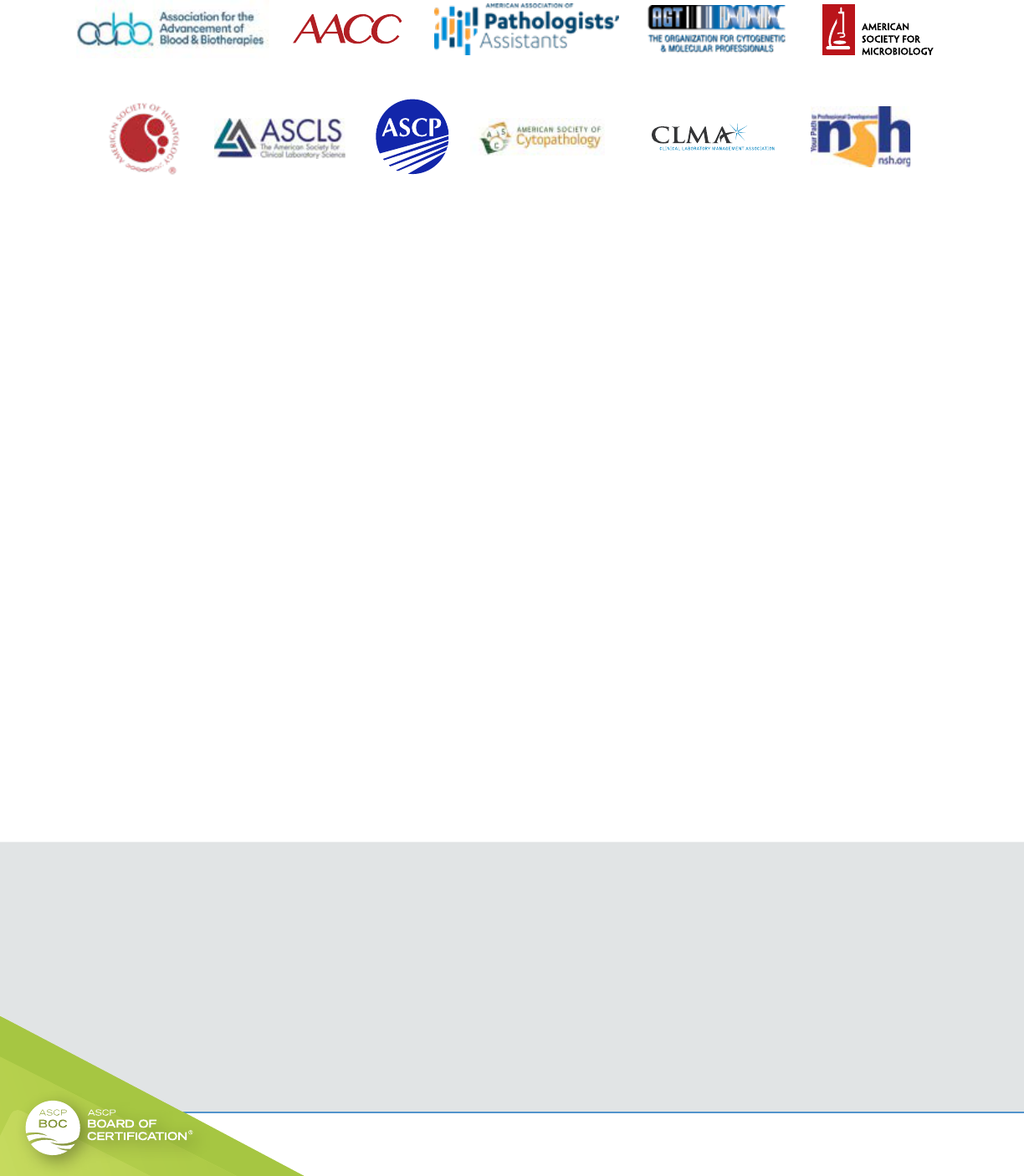
December 2021 BOC Newsletter | Page 14
EDITOR
Patricia Tanabe, MPA, MLS(ASCP)
CM
MANAGING EDITOR &
PRODUCTION COORDINATOR
Robin Lewis, PBT(ASCP)
INTERNATIONAL MANAGING EDITOR
Joseph Brendan Baker, MS
CHAIR-BOG
Susan Johnson, MSTM, MT(ASCP)SBB
CM
INTERNATIONAL CREDENTIALING COMMITTEE
Chair
Catherine Gebhart, PhD, D(ABHI), MB(ASCP)
CM
EDITORIAL COMMITTEE
Chair
Vicki Freeman, PhD, MASCP, MLS(ASCP)
CM
SC
CM
FAACC
Elaine B. Francis, EdD
Patti J. Walton, MHSA, MT(ASCP)
Lori Schmitt, HT(ASCP)QIHC
CM
BOC PROFESSIONAL PARTNERS
Sponsoring Societies
Association of Genetic Technologists (AGT)
American Society for Clinical Laboratory Science (ASCLS)
American Society for Clinical Pathology (ASCP)
Participating Societies
American Association of Pathologists’ Assistants (AAPA)
American Society of Cytopathology (ASC)
American Society for Microbiology (ASM)
Association for the Advancement of Blood & Biotherapies (AABB)
Clinical Laboratory Management Association (CLMA)
National Society for Histotechnology (NSH)
Collaborating Societies
AACC
American Society of Hematology (ASH)
The mission of the ASCP Board of Certication (BOC) is to provide excellence
in certication of laboratory professionals on behalf of patients worldwide.
The vision of the ASCP Board of Certication (BOC) is to be the
gold standard in global certication for all laboratory professionals.
